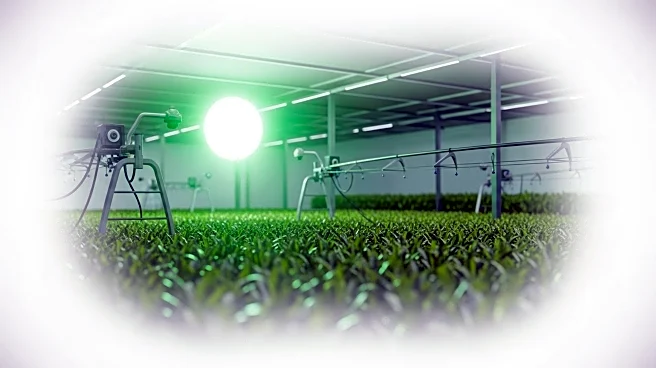What is the story about?
What's Happening?
The climate-resilient agriculture market in the United States is expected to grow significantly, reaching $61.50 billion by 2032. This growth is driven by the increasing adoption of technologies and practices aimed at mitigating the impacts of climate change on crop production. Key developments include the introduction of drought-tolerant corn seeds by Corteva Agriscience in Nebraska, AI-driven precision irrigation systems by Monsanto in California, and climate-resilient soybean cultivars by Bayer CropScience in the Midwest. These innovations are designed to enhance crop yields and reduce environmental impact amid erratic weather patterns. The market is also supported by advancements in AI-powered soil monitoring tools by John Deere, which provide farmers with detailed insights into soil health and moisture levels.
Why It's Important?
The expansion of the climate-resilient agriculture market is crucial for ensuring food security and maintaining yield stability in the face of increasing climate variability. As extreme weather events become more frequent, the ability to adapt agricultural practices is vital for sustaining crop production. The adoption of climate-smart technologies not only helps farmers optimize resource use but also reduces the environmental footprint of agriculture. This market growth reflects a broader trend towards sustainable farming practices, supported by government programs and investments in agricultural research. Companies like John Deere, Indigo Agriculture, and CropX are leading the way in developing solutions that enhance the resilience of crops to climate change.
What's Next?
The continued growth of the climate-resilient agriculture market will likely see further innovations in crop varieties and farming technologies. As the market expands, stakeholders including agribusinesses, farmers, and policymakers will need to collaborate to address challenges such as resource allocation and technology adoption. The integration of AI, IoT, and data analytics in farming practices is expected to play a significant role in optimizing agricultural productivity and sustainability. Additionally, ongoing research and development efforts will focus on enhancing the resilience of crops to extreme weather conditions, ensuring long-term food security.
Beyond the Headlines
The shift towards climate-resilient agriculture has broader implications for environmental sustainability and economic stability. By adopting practices that reduce the impact of agriculture on the environment, the industry can contribute to global efforts to combat climate change. Moreover, the development of resilient crop varieties and advanced farming technologies can help mitigate the economic risks associated with climate-induced crop failures. This transition also presents opportunities for innovation and growth in the agricultural sector, potentially leading to new business models and market dynamics.















